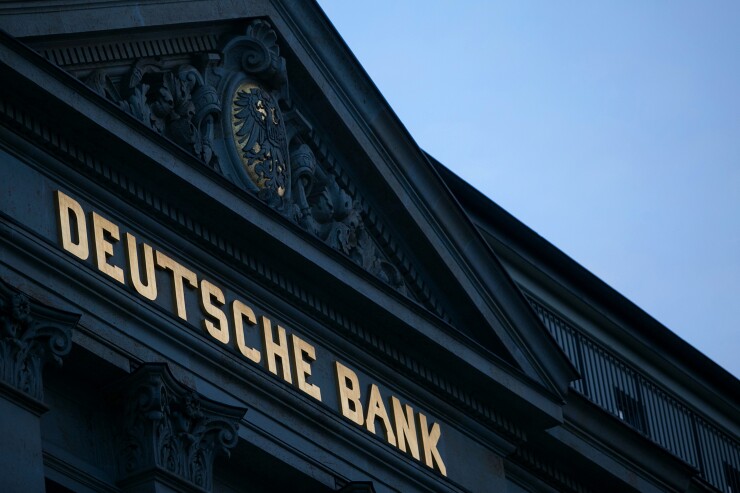For allegedly failing to live up to its own ESG-related promises and to have adequate anti-money laundering policies, Deutsche Bank's U.S. investment advisory subsidiary owes $25 million.
The Securities and Exchange Commission announced Monday that it had reached the multimillion-dollar settlement with DWS Investment Management Americas, a wealth management subsidiary under the Frankfurt, Germany-based financial giant Deutsche Bank. Of the total penalty, $19 million relates to allegations that DWS Investment Management failed to live up to promises it had made with a proprietary system known as the "DWS ESG engine."
The system was meant to fulfill the goals of clients who wanted to see their money invested to further certain
"Whether advertising how they incorporate ESG factors into investment recommendations or making any other representation that is material to investors, investment advisers must ensure that their actions conform to their words," Sanjay Wadhwa, the deputy director of the SEC's division of enforcement and head of its climate and ESG task force, said in a statement.
Controversy
Deutsche Bank has seen its ESG-related practices come under scrutiny before. The bank's Frankfurt offices were raided in the summer of 2022 after a whistleblower told authorities that executives there had been engaged in a deceitful practice known as "greenwashing," or making false claims about the environmental benefits of certain strategies. The CEO of DWS's asset management branch stepped down shortly afterward.
In a statement on Monday, a Deutsche Bank spokesperson noted that the SEC's latest charges contained no allegations of "misstatements in relation to our financial disclosures or in the prospectuses of our funds."
READ MORE:
"We have consistently stated that we stand by our financial disclosures and the disclosures in our fund prospectuses," the spokesperson, Kenny Juarez, said in an email. "The order also makes clear that the weaknesses identified by the SEC are in relation to processes and procedures that the firm has already taken steps to address."
The SEC's charges, which Deutsche Bank did not admit or deny, also took DWS Investment Management to task for a marketing article it paid to run in the trade publication Pensions and Investments in January 2020. Titled "When ESG Is in Your DNA," the piece boasted that "Ensuring that ESG is top of mind throughout our organization has become part of everything that we do."
An internal review by DWS's ESG Integration Team of the firm's research notes in the fourth quarter of 2020 later found widespread failures to live up to its ESG promises. Of the notes on active equities that were reviewed, only slightly more than half mentioned ESG criteria, as did only 21% of notes on fixed income investments.
Regulators have been subjecting firms' ESG-related statements to additional scrutiny in recent years. On Sept. 20,
Deutsche Bank isn't the only large firm to be hit with allegations of ESG-related violations. Last November,
READ MORE:
Separately, DWS Investment Management agreed to pay $9 million to resolve charges related to its alleged lack of adequate anti-money laundering policies. The SEC accused the firm of not instituting policies required by the Banking Secrecy Act of 1970 for mutual funds it advised and not taking steps to detect and prevent money laundering, among other things.
"The SEC's order finds that DWS advised mutual funds with billions of dollars in assets yet failed to ensure that the funds had an AML program tailored to their specific risks, as required by law," said Gurbir Grewal, the director of the SEC's division of enforcement in a statement.






